

Arcane Traditions
At 2nd level, a wizard gains the Arcane Tradition feature. The following options are available to a wizard along with those in the Players Handbook: Hedge Magic, Familiarist, Ritualist, and the formal Schools of Alchemy, Biomancy, Chronomancy, Hemomancy, Hexcraft, Metallurgy, and Theurgy.
Hedge Magic
While almost all wizards study in formal schools under the tutelage of a wise master, some wizards reject traditional arcane schooling and strike out into the world to learn by doing. These rare few who hone their craft out in the wilds are referred to as Hedge Wizards. Though their methods are frowned upon by formal wizarding schools, any archmage worthy of his station will reluctantly recognize that Hedge Wizards are the true masters of the low magics.
Regardless of their background, all Hedge Wizards reject the traditional methods of wizardry. When creating your Hedge Wizard consider how your spellcasting and spellbook may differ from a wizard who attended a formal school.
Hedge Magic Features
| Wizard Level | Feature |
|---|---|
| 2nd | Cantrip Savant, Self-Taught |
| 6th | On the Fly |
| 10th | Hardy Magic |
| 14th | Arcane Conservation |
Cantrip Savant
Your unorthodox relationship with arcane magic allows you to you learn fundamental magics not traditionally associated with wizards. When you adopt this Arcane Tradition at 2nd level, you learn one cantrip of your choice from any spell list. The chosen cantrip counts as a wizard spell for you, but does not count against your total number of Cantrips Known.
You learn additional cantrips in this way as you gain levels in this class; one each at 6th level, 10th level, and 14th level.
Self-Taught
Your deep understanding of the low magics allows you to add them to your spellbook at a discount. Starting at 2nd level, the time you must spend to copy any spell of a level equal to half your proficiency bonus or lower into your spellbook is halved, and the cost of the materials and inks is reduced by 50 gold.
On the Fly
Your skill with basic magic is second to none, allowing you to spontaneously cast low-level spells that you haven't prepared. Beginning at 6th level, you can use your action to cast any spell of 2nd-level or lower from your spellbook, even if you don't have the spell prepared, expending the appropriate spell slot. The spell must have a casting time of one action.
You can cast a spell in this way a number of times equal to your Intelligence modifier (minimum of once), and you regain all expended uses when you finish a long rest.
As you gain levels in this class, you can cast more powerful spells with this feature: 3rd-level spells at 10th level, 4th-level spells at 14th level, and finally 5th-level spells at 18th level.
Hardy Magic
Learning your magic out in the wild instead of the controlled environment of a formal school has made you hardier than most wizards. Starting at 10th level, when you are forced to make a Constitution saving throw to maintain concentration on a spell, you can use a reaction to grant yourself a bonus to the roll equal to your Intelligence modifier (minimum of +1).
You can use this reaction after you roll, but before you determine whether you succeed or fail.
Arcane Conservation
Your understanding of arcane fundamentals allows you to recycle the energy of failed spells. Beginning at 14th level, when you cast a wizard spell of 4th-level or lower and the spell fails, you regain one expended spell slot. The spell slot regained must be a lower level than the spell slot used to cast the failed spell. This feature applies to all spells of 4th-level or lower, even if they are cast with a higher level spell slot.
When you reach 18th level in this class, this ability affects any wizard spells of 5th-level and lower.
What is a Failed Spell?
Your Arcane Conservation feature allows you to regain a spell slot when one of your spells fails. For the purposes of this ability, a failed spell is a spell that imposes no effects and deals no damage to the environment, creatures, or objects when cast. If a creature uses a Legendary Resistance to avoid a spell's effect, it does not count as a failed spell.




Familiarist
While many a mage may form a bond with their familiar, none are as strong as the wizards known as Familiarists. They use their knowledge of conjuration and transmutation magic to enhance the standard familiar with wondrous arcane power.
Familiarist Features
| Wizard Level | Feature |
|---|---|
| 2nd | Familiar Savant, Greater Familiar |
| 6th | Bonded Transposition |
| 10th | Arcane Coordination |
| 14th | Archfamiliar |
Familiar Savant
When you adopt this Arcane Tradition at 2nd level, you add the find familiar spell to your spellbook. In addition, when you cast find familiar as a ritual, you do not need to provide the normal material components for the spell.
Greater Familiar
When you adopt this Arcane Tradition at 2nd level, you learn to enhance your familiar with your arcane power. When you cast find familiar, you use the Greater Familiar stat block at the end of this Tradition, which uses your proficiency bonus (PB) and Intelligence modifier (INT) in several places.
Each time you conjure your Greater Familiar it gains a number of Arcane Amalgamation features equal to your proficiency bonus from the list at the end of this Tradition. You can change these features each time you conjure it.
In combat, your Greater Familiar acts during your turn. It can move and use its reaction on its own, but it only takes the Dodge action unless you use your action or bonus action to command it to take an action from its stat block, or another action. If you are incapacitated, your Greater Familiar acts independently to protect you as best as it can.
Other then the differences described here, your Greater Familiar uses the same features as a normal familiar.
Bonded Transposition
The otherworldly bond between you and your familiar has grown. Starting at 6th level, you can use an action to switch places with your familiar, each instantly teleporting to the other's space, so long as you can see your Greater Familiar.
You can use this feature a number of times equal to your Intelligence modifier (minimum of once), and you regain all expended uses each time you finish a long rest.
Arcane Coordination
Beginning at 10th level, while you are within 30 feet of your Greater Familiar and either you or your Greater Familiar is forced to make a saving throw, either of you can use your reaction to give the other advantage on their saving throw.
Archfamiliar
Your familiar towers over those of other wizards. Starting at 14th level, when you conjure your Greater Familiar, you can choose for its size to be Tiny, Small, Medium, or Large.
For each size category your Greater Familiar is above Tiny, its Strength score and total hit points each increase by 5.
Greater Familiar
Tiny celestial (good), fey (neutral), or fiend (evil)
- Armor Class 8 + PB + your Intelligence modifier
- Hit Points 4 + five times your wizard level
- Speed 30 ft., climb 20 ft.
STR DEX CON INT WIS CHA 4 (-3) 16 (+3) 12 (+1) 10 (+0) 12 (+1) 10 (+0)
- Senses passive Perception 11 +PB
- Languages understands the languages you speak
Conjurer's Bond. You add your PB to any ability check or saving throw that your familiar makes.
Arcane Amalgamation. Each time you summon your familiar it gains a number of Amalgamation features of your choice equal to your PB from the list below.
Actions
Bite. Melee Weapon Attack: your spell attack modifier to hit, reach 5 ft., one target. Hit: 1d4 +3 +PB piercing damage.
Arcane Amalgamation
Below are the Arcane Amalgamation features a wizard can choose from each time they conjure their Greater Familiar:
Amphibious. The familiar gains a swimming speed equal to its walking speed and can breath both air and water.
Camoflage. The familiar has advantage on Dexterity (Stealth) checks when it holding still or lightly obscured.
Elusive. The familiar does not provoke opportunity attacks when it moves out of an enemy creature's reach.
Enhanced Sight. The familiar gains Darkvision out to a radius of 60 ft. If you choose this feature a second time the familiar also gains Blindsight within that 60-foot radius.
Flight. The familiar gains a flying speed equal to its walking speed, and while it is conscious it can hover.
Fortified Frame. The familiar gains 1 additional hit point per wizard level. You can choose this feature multiple times.
Keen Senses. The familiar has advantage on Wisdom (Perception) checks that rely on its hearing, smell, or sight.
Telepathy. The familiar can magically communicate simple ideas, emotions, and images telepathically with any creature within 100 ft. of it that can understand at least one language.
Mimicry. The familiar can mimic simple sounds it has heard, such as a person whispering or an animal chittering.
A creature can tell the sounds are imitations by succeeding on a Wisdom (Insight) check against your spell save DC.
Pack Tactics. The familiar has advantage on attack rolls if a conscious allied creature is within 5 feet of it's target.
Swift. The familiar's walking and climb speed increase by 10 feet. You can choose this feature multiple times.
Tunneler. The familiar gains a 10 ft. burrow speed that it can use to tunnel through loose rocks, dirt, sand, and soil.

Ritualist
Wizards spend their lives memorizing esoteric formulas that allow them to produce wondrous arcane effects. However, when produced spontaneously, spells are extremely taxing
on the caster. To preserve their power, most wizards learn to cast ritual spells, spells that take longer to produce, but aren't as draining on said wizard's magical stamina. Some wizards, known as Ritualists, dedicate their great intellect to mastery over the deliberate and reliable magic of ritual spellcasting.
Ritualist Features
| Wizard Level | Feature |
|---|---|
| 2nd | Ritual Savant, Arcane Anthology |
| 6th | Accelerated Rituals |
| 10th | Formulaic Breakthrough |
| 14th | Master Ritualist |
Ritual Savant
Starting at 2nd level, the gold and time you must spend to copy a ritual spell into your spellbook is halved.
Arcane Anthology
You have learned to perform arcane rituals not normally known to wizards. At 2nd level, you add two 1st-level ritual spells of your choice from any spell list to your spellbook.
In addition, you can copy ritual spells from any class's spell list into your spellbook, though you must otherwise follow the normal rules for copying these spells into your spellbook.
Any non-wizard spell you add to your spellbook with this feature counts as wizard spell for you, but you can only cast
it as a ritual, unless you've learned it by some other means.
Accelerated Rituals
You can accelerate the ritual process for spells with which you are exceptionally familiar. Beginning at 6th level, you
can cast the ritual version of any 1st-level spell from your spellbook without the additional 10 minute casting time.
You can accelerate a ritual spell in this way a number of times equal to your Intelligence modifier (minimum of once), and you regain all expended uses when you finish a long rest.
As you gain levels in this class, you learn to accelerate higher-level ritual spells: 2nd-level rituals at 10th level, 3rd-level rituals at 14th level, and 4th-level rituals at 18th level.
Formulaic Breakthrough
Your deep knowledge of ritual magic allows you to ritualize even non-ritual spells. Starting at 10th level, you can cast any 1st-level spell in your spellbook as a ritual so long as it deals no damage and does not require a saving throw.
As you gain levels in this class you learn to ritualize higher level spells that don't deal damage or require a saving throw; 2nd-level spells at 14th level, and 3rd-level spells at 18th level.
Ritualists and Research
While all wizards rely on spell scrolls, Ritualists are known for going to great lengths to expand their spellbooks, especially looking to add new rituals.
Master Ritualist
You have reached an unparalleled understanding of ritualistic magic and its applications. Beginning at 14th level, you can concentrate on the effects of up to two ritual spells at once.
The total levels of the spells you concentrate on cannot exceed your Intelligence modifier (minimum of 1st-level), and when you are forced to make a Constitution saving throw to maintain concentration on your spells, you make one saving throw for both concentration effects.
In addition, whenever you cast the ritual version of a spell that has a duration longer than instantaneous, the duration of the spell's effect is doubled.
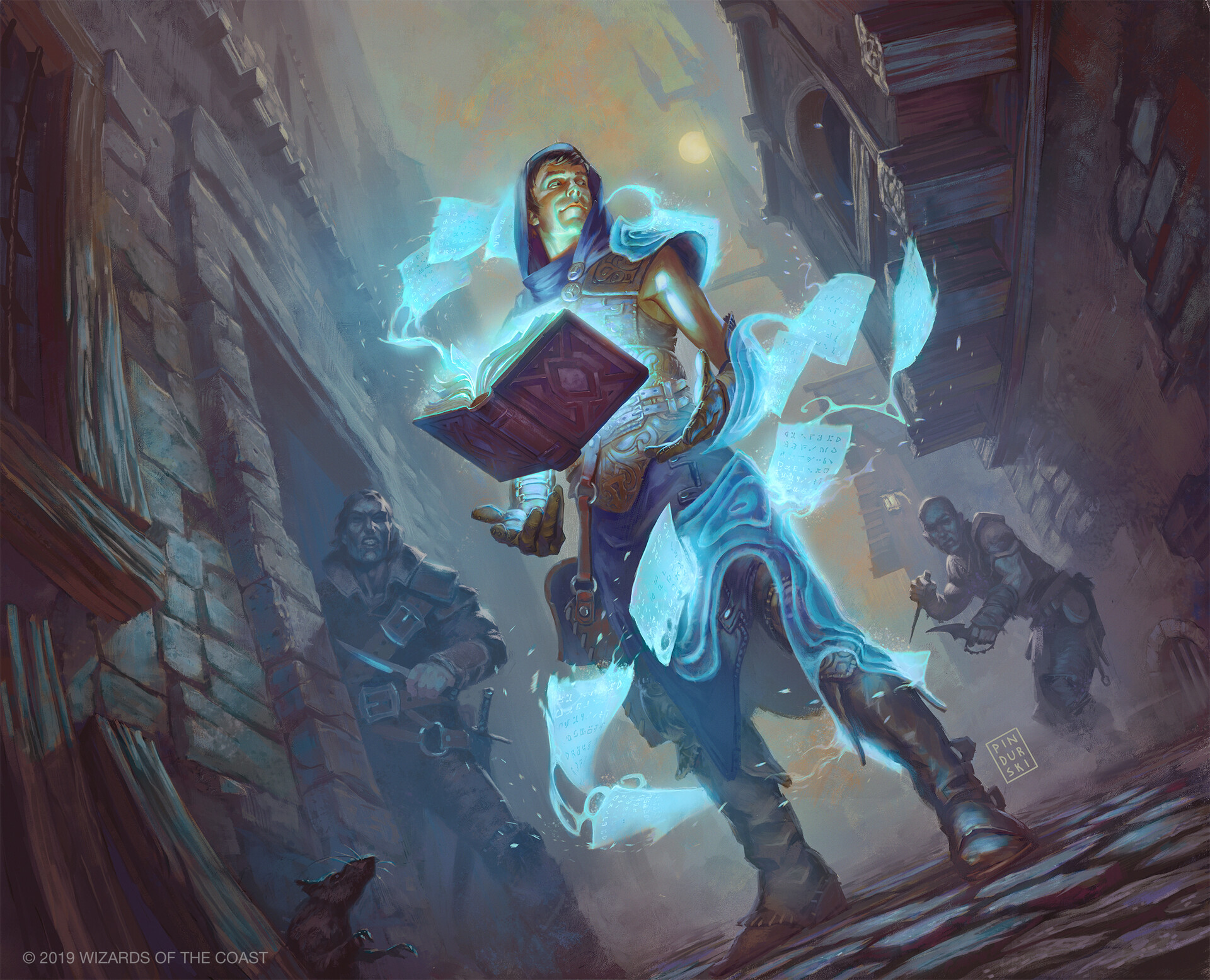



The School of Alchemy
Alchemy is a delicate art, tip the ratio of reagents too far out of line and the effects are disastrous. Wizards that pursue the art of alchemy are experts at combining exotic ingredients to produce a variety of arcane effects. From brews that grow or shrink a creature, to sticky goo that explodes when it comes in contact with flame. With access to the right reagents, and
a bit of luck, students of alchemy use their wondrous Arcane Elixirs aid their allies and leech life away from their enemies.
School of Alchemy Features
| Wizard Level | Feature |
|---|---|
| 2nd | Alchemical Savant, Arcane Elixirs |
| 6th | Efficient Arcana |
| 10th | Alchemical Savant Improvement, Experimental Fortitude |
| 14th | Greater Homunculus |
Alchemical Savant
When you adopt this Arcane Tradition at 2nd level, you learn the secrets of arcane alchemy. You gain proficiency with both alchemist's supplies and glassblower's tools. When you reach 10th level in this class, you can add double your proficiency bonus to any ability check you make that uses these tools.
Arcane Elixirs
Also at 2nd level, you learn to create potent potions known as Arcane Elixirs. During a long rest, you can spend 1 hour with your alchemist's supplies to create your Arcane Elixirs, which can mimic the effects of certain spells in your spellbook.
You can create an Arcane Elixir that mimics the effect of any spell from your spellbook that has a casting time of one action and targets only one creature. Any Arcane Elixirs you create appear as Tiny glass vials or flasks of iridescent liquid, and reproduce the spell effect at its lowest possible level.
As an action, a creature can drink an Elixir, administer an Elixir to a willing creature within 5 feet, or throw an Elixir at a point within 30 feet to produce its spell's effect at the point of impact. If an Elixir's spell effect requires concentration, the creature that drinks it must concentrate on the effect. Elixirs use your wizard spell save DC and spellcasting modifier.
During each long rest, you can create a number of Arcane Elixirs with a combined spell level equal to your proficiency bonus + your Intelligence modifier. At the end of your next long rest, any unused Elixirs become inert and unusable.
Efficient Arcana
Your alchemical knowledge and skill has improved. Starting at 6th level, you can spend 10 minutes with your alchemist's supplies, which can be during a short rest, to recycle one of your unused Arcane Elixirs, changing its effect to another spell of your choice of the same level from your spellbook.
Moreover, you can use an action to create an Arcane Elixir of a spell you have prepared, expending the spell slot as you normally would. An Arcane Elixir of the spell then appears in your empty hand. A spell used to create an Elixir in this way must meet all the requirements for being an Arcane Elixir.
Experimental Fortitude
At 10th level, your work with strange and wondrous arcane reagents has fortified your body. You gain resistance to both acid and poison damage, and you have advantage on saving throws to resist being poisoned.
Greater Homunculus
Upon reaching 14th level, you achieve the ultimate goal of every alchemist, the creation of artificial life. You learn the clone spell. Using your alchemist's supplies, you can cast a special version of clone by spending 8 hours, which can be during a long rest, molding organic material into an exact copy of yourself. All of your clone's game statistics are the same as yours, but you share Hit Dice and spell slots.
In combat, your clone shares your initiative and acts on your turn. Though, it can only take the Dodge action unless you use your bonus action to issue it a telepathic command.
If your clone is reduced to 0 hit points it is immediately destroyed, and reverts to a pile of raw organic materials.
Which one is the Clone?
When an alchemist creates a clone through their Greater Homunculus feature, it is indistinguishable from the original. They share everything, including their memories. The only difference between the original and the clone, is the clone will always obey its creator... At least that is the alchemist's hope.
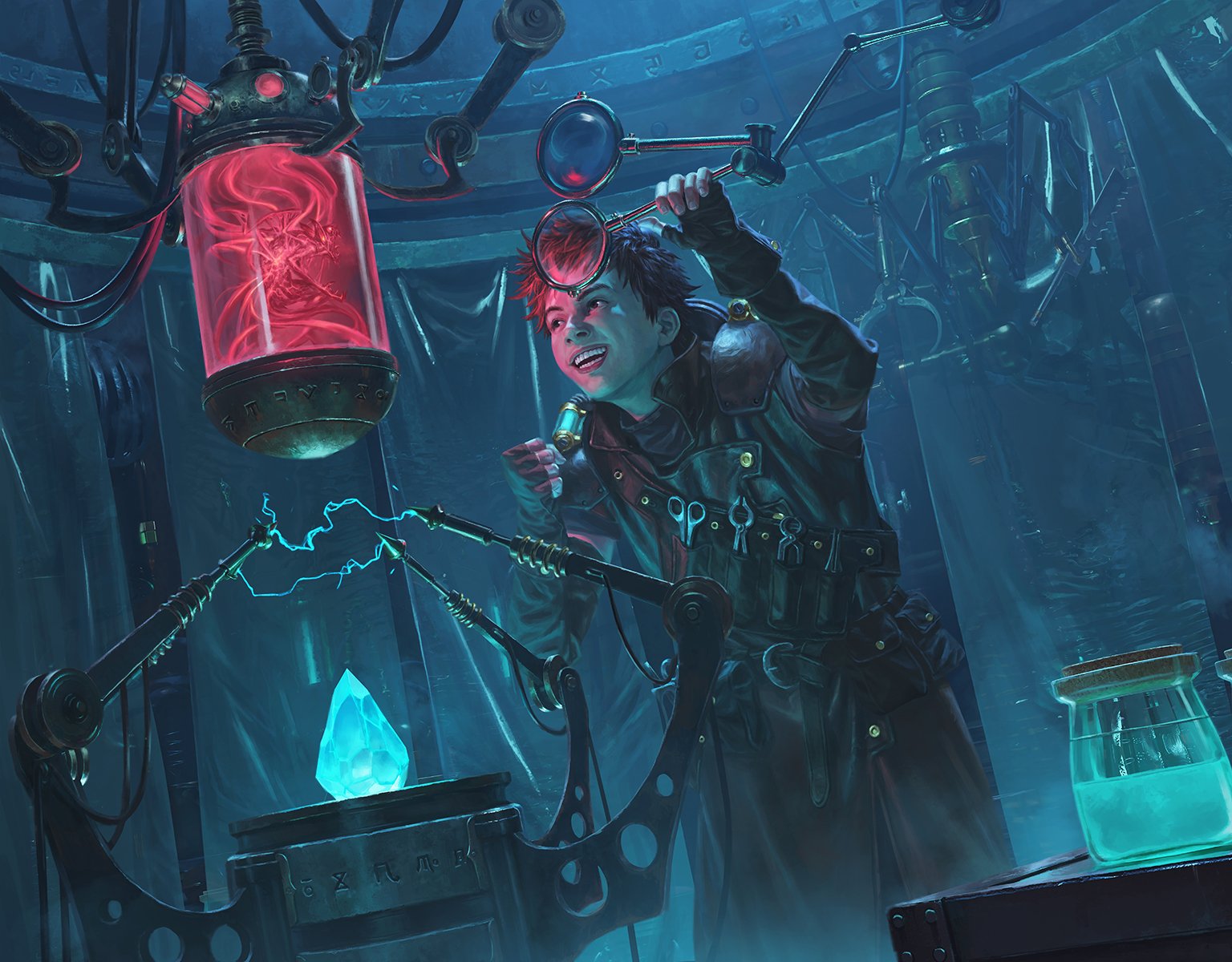



The School of Biomancy
While most scholars of the arcane arts pursue metaphysical power, some focus their study on more concrete applications of magic. Wizards that join the School of Biomancy combine powerful transmutation and necromancy magic to alter and enhance their own physical forms. These strange mages are masters of manipulating the organic matter that makes up all living things, and they do not hesitate to make evolutionary adjustments to themselves, or those who travel with them.
School of Biomancy Features
| Wizard Level | Feature |
|---|---|
| 2nd | Biomancy Savant, Organic Familiar |
| 6th | Modular Biology |
| 10th | Arcane Vigor |
| 14th | Evolutionary Breakthrough |
Biomancy Savant
Beginning when you adopt this Arcane Tradition 2nd level, the spells in the Biomancy Spells table below count as wizard spells for you, and they are considered to be Biomancy spells in addition to their normal schools of magic.
Moreover, the gold and time you must spend to copy one of these Biomancy spells into your spellbook is halved. Finally, each time you gain a wizard level, the spells you add to your spell book can be chosen from the Biomancy spells below.
Biomancy Spells
| Spell Level | Spell |
|---|---|
| 1st | false life, jump, longstrider |
| 2nd | alter self, enlarge/reduce, spider climb |
| 3rd | haste, life transference, water breathing |
| 4th | blight, polymorph, stoneskin |
| 5th | reincarnate, skill empowerment |
| 6th | create homunculus, flesh to stone |
| 7th | regenerate, simulacrum |
| 8th | clone, horrid wilting |
| 9th | shapechange, true polymorph |
Organic Familiar
You can use the magic of Biomancy to create a facsimile life. At 2nd level, you add the find familiar spell to your spellbook, and when you cast find familiar it has the following changes:
- The material component is 1 pound of organic matter.
- It is a monstrosity (instead of a celestial, fey, or fiend).
- It has additional hit points equal to your wizard level.
In addition, your familiar can heal others by grafting its own flesh onto the creature's wounds. As an action, your familiar can sacrifice any amount of its hit points, touching
a willing creature and healing them for the same amount.
Modular Biology
Beginning at 6th level, you use your knowledge of Biomancy to enhance your own physical form. At the end of each long rest, choose one of the body modifications listed below, the benefits of which last until the end of your next long rest.
Amphibious Physiology. You develop gills and webbing between your digits. You can breathe both air and water, and you gain a swimming speed equal to your walking speed.
Resilient Hide. Your flesh becomes thick and knotted. While not wearing any armor, your Armor Class is equal to
10 + your Intelligence modifier + your Constitution modifier.
Vestigial Limb. You grow an additional limb resembling a smaller version of your other limbs. It has a reach of 5 feet, and it can lift a number of pounds equal to your Intelligence score. The limb cannot use weapons or shields nor can it do anything that requires manual precision, such as using tools.
Arcane Vigor
Your biomagic enhances the life force of other creatures. Starting at 10th level, when you target a creature with a Biomancy spell, or your Organic Familiar heals a creature, you can grant the creature temporary hit points equal to your Intelligence modifier (minimum of 1 temporary hit point).
Evolutionary Breakthrough
Beginning at 14th level, your familiar can graft itself onto a willing creature as an action, granting them temporary hit points equal to its remaining hit points. The creature then gains a Modular Biology modification of your choice, which lasts until their temporary hit points are depleted.
Casting find familiar again while this ability is active causes any benefits of this feature to immediately dispel.
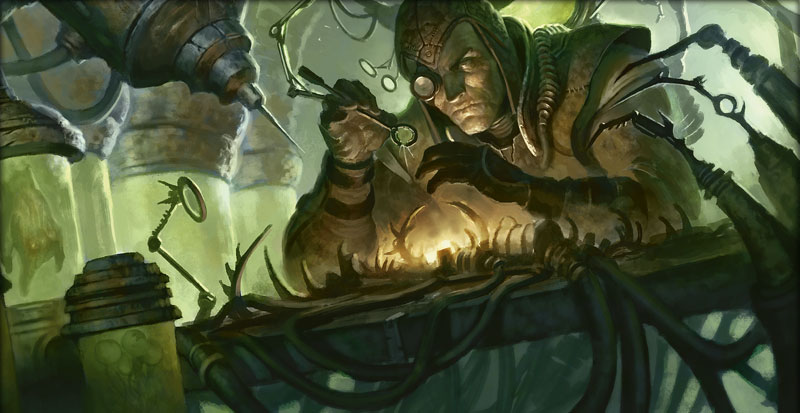


The School of Chronomancy
Considered by many scholars to be the ninth school of magic, Chronomancy, the magic of time, is only studied by a rare few. Usually, magic that affects the flow of time is forbidden. If a Chronomancer outwardly announces their focus on this magic they often bring unintended consequences down on themselves in the form of inquisitors seeking to prevent the catastrophe that comes with changing the flow of time.
School of Chronomancy Features
| Wizard Level | Feature |
|---|---|
| 2nd | Chronomancy Savant, Visions of the Past |
| 6th | Arcane Foresight |
| 10th | Paradoxical Spellcasting |
| 14th | Master Chronomancer |
Chronomancy Savant
Beginning when you adopt this Arcane Tradition 2nd level, the spells in the Chronomancy Spells table below count as wizard spells for you, and they count as Chronomancy spells in addition to their normal schools of magic.
Moreover, the gold and time you must spend to copy a Chronomancy spell into your spellbook is halved. Finally, each time you gain a wizard level, the spells you add to your spellbook can be from the Chronomancy Spells table below.
Chronomancy Spells
| Spell Level | Spell |
|---|---|
| 1st | expeditious retreat, feather fall, longstrider |
| 2nd | blur, hold person, gentle repose |
| 3rd | catnap, haste, slow |
| 4th | blight, resilient sphere |
| 5th | hold monster, modify memory |
| 6th | contingency, disintegrate |
| 7th | delayed blast fireball, sequester |
| 8th | maze, power word stun |
| 9th | foresight, time stop |
Visions of the Past
Starting at 2nd level, you can see echoes of past events in the present. Whenever you make an Intelligence (History) check while you are in the location where the even took place, you can add double your proficiency bonus to your roll.
Your unique perspective on the flow of time is also source of guidance and insight. At 2nd level you learn the guidance cantrip, which counts as a wizard spell for you, but it doesn't count against your total number of Cantrips Known.
Arcane Foresight
You have gained the ability manipulate the flow of time for creatures around you, if only for a moment. Starting at 6th level, when you roll initiative and are not surprised, you can force a creature of your choice within 60 feet to make a Charisma saving throw. On a failed save, your initiatives are switched for the duration of that combat encounter.
A friendly creature can willingly fail their saving throw.
Paradoxical Spellcasting
Beginning at 10th level, your mastery over the flow of time allows you to borrow arcane power from your future self. As
a bonus action on your turn, can draw a spell slot from a future version of yourself to recover one of your expended spell slots of 5th-level or lower.
You can draw a maximum number of spell slots through this ability with a combined level equal to your Intelligence modifier (minimum of 1). At the end of a short or long rest, you can complete a brief ritual where you expend spell slots that you drew from your future self, regaining expended uses of this feature equal to the level of the spell slots you expend.
Master Chronomancer
Your mastery over the magic of time rivals the most powerful creatures of the multiverse. Starting at 14th level, you can use your power to undo events in time. When a creature within 60 feet of you ends its turn, you can choose to undo anything that occurred during that creature's turn. The target instantly returns to the space it began its turn, regains any expended spell slots or abilities, and any effects of their actions are undone. The creature then repeats its turn exactly as before, though you are aware of the actions it will take.
Once you use this reaction to rewind time, you must finish a long rest before you can use it again, unless you expend a spell slot of 6th-level or higher to use it an additional time.




The School of Hemomancy
Though considered barbaric by most wizards, Hemomancy, also known as blood magic, is one of the most powerful and ancient Arcane Traditions. Discovered in ages long forgotten by priests of dark gods, Hemomancers use the power of their own lifeblood to work sinister spells of overwhelming power.
Warning: The Dangers of Blood Magic
The School of Hemomancy has the potential for great power, but at great risk. Any reduction to the already low maximum hit points of a wizard is dangerous, and reducing a player's maximum hit points to 0 causes instant death. This Arcane Tradition is not recommended for beginner players.
School of Hemomancy Features
| Wizard Level | Feature |
|---|---|
| 2nd | Hemomancy Savant, Blood Magic |
| 6th | Vampiric Restoration |
| 10th | Sanguine Vigor |
| 14th | Sinister Empowerment |
Hemomancy Savant
When you adopt this Arcane Tradition at 2nd level, you learn to copy spells into your spellbook in your blood. When you do so, both your current and maximum hit points are reduced by 1 per level of the spell you copy in place of expending the gold and ink. Any reduction to your maximum hit points from this feature cannot be reduced in any way.
You are also able to learn dark magic unknown to most wizards. You can copy any spell you find in a spell scroll or spellbook into your own spellbook, so long as it deals only poison or necrotic damage. Any spell you gain through this feature must be copied into your spellbook in your blood. It then counts as a wizard spell for you if it wasn't already.
Blood Magic
At 2nd level, you learn to use the ancient and sinister magic of Hemomancy to sacrifice your lifeblood to fuel your arcane abilities. As a bonus action, you can regain one expended wizard spell slot by reducing both your current hit points, and maximum hit points by an amount equal to twice the level of the spell slot you wish to regain. This reduction to your hit points cannot be lessened in any way. You cannot use this feature to regain a spell slot higher then 5th-level.
At the end of each long rest, if your maximum hit points have been reduced by one of your Hemomamcy features, that reduction is reduced by 1. You can also choose to expend Hit Dice at the end of a long rest, reducing any reduction to your hit point maximum by a number of hit points equal to your Constitution modifier (minimum of 1 hit point).
Vampiric Restoration
You can use Hemomancy magic to drain life from your foes. Beginning at 6th level, whenever you deal poison or necrotic damage to a creature with a wizard spell, you can choose to gain temporary hit points equal to half the damage dealt.
You can use this ability a number of times equal to your Intelligence modifier (minimum of once), and you regain all expended uses when you finish a long rest.
Sanguine Vigor
Your use of blood magic fortifies your body. At 10th level you gain resistance to necrotic and poison damage, and you have advantage on saving throws against poison and disease.
Your magic also allows you to regenerate more quickly. At the end of each long rest, you regain additional expended Hit Dice equal to your Constitution modifier (minimum of 1).
Sinister Empowerment
Beginning at 14th level, you can increase the power of spells that sap the life from others. When you cast a wizard spell of 1st-level or higher that deals poison or necrotic damage you can choose to deal maximum damage in place of rolling.
The first time you do so each day, you suffer no adverse effects. However, each subsequent time you use this ability before you finish a long rest, your current and maximum hit points are reduced by an amount equal to twice the level at which you cast the spell you maximized with this feature.
Hemomancy in Practice
Vlad the Hemomancer wizard finds a spell scroll of shadow of moil, a spell not normally available to wizards. That night, he copies the spell, using his blood, into his spellbook. Since shadow of moil is a 4th-level spell, his maximum hit points are reduced by 4, from 34 to 30. At the end of his next long rest, the reduction to Vlad's maximum hit points is lessened by 1. His hit point maximum is now 31.
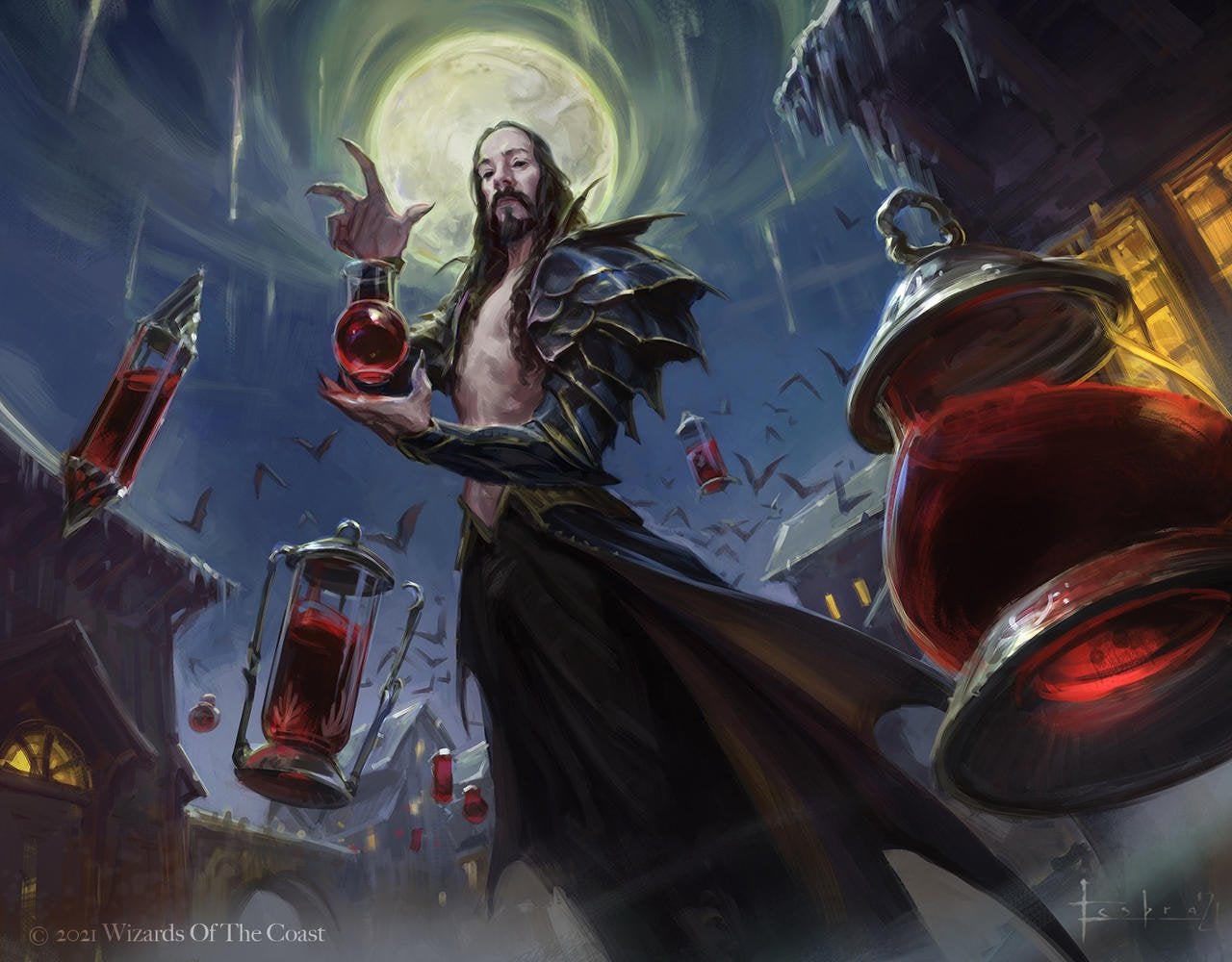



The School of Hexcraft
Some who study the arcane aren't satisfied with traditional schools of wizardry and turn to the dark arts in their hunger for power. Striking out into the wild, they seek out beings from the lower planes, creatures from the Shadowfell, or vile covens of hags in order to learn otherworldly eldritch magic.
Many who follow this path are willing to sacrifice anything, even their eternal soul, in order to learn sinister magics often reserved for those who enter pacts with eldritch entities.
School of Hexcraft Features
| Wizard Level | Feature |
|---|---|
| 2nd | Eldritch Savant, Forbidden Arcana |
| 6th | Profane Ritual |
| 10th | Inscrutable |
| 14th | Heart of Darkness |
Eldritch Savant
When you adopt this Arcane Tradition at 2nd level, you gain access to magic that is shunned by all by the most unhinged. You can copy warlock spells that you find in other spellbooks or spell scrolls into your spellbook. Warlock spells gained through this feature count as wizard spells for you.
Also, when you gain a level in this class, one of the spells you add to your spellbook must be from the warlock spell list.
Forbidden Arcana
In your study of dark magics you have gained for yourself strange and sinister abilities. At 2nd level, you learn of two Eldritch Invocations of your choice from the list below.
When you gain a level in this class, you can switch your Invocation for another of your choice from the list below.
You learn an additional Eldritch Invocation from this list when you reach 6th, 10th, and 14th level in this class.
Beast Speech. You can cast speak with animals at will, without expending a spell slot or material components.
Beguiling Influence. You gain proficiency in both the Deception and Persuasion skills.
Devil's Sight. You can see normally in darkness, both magical and nonmagical, to a distance of 120 feet.
Eldritch Sight. You can cast detect magic, at will, without expending a spell slot or material components.
Eyes of the Rune Keeper. You can read and understand all written symbols and writing.
Misty Visions. You can cast silent image at will, without expending a spell slot or material components.
One with Shadows. When you are in an area of dim light or darkness, you can use your action to become invisible until you move or take an action or a reaction.
Profane Ritual
You can use your knowledge of dark magic to enhance your life force at the cost of your surroundings. Beginning at 6th level, when you finish casting the ritual version of a wizard spell, you can grant yourself temporary hit points equal to the level at which you cast the ritual spell + your wizard level. When you complete a ritual in this way, area around you is noticeably withered and sickly, and delicate life dies.
Inscrutable
You have learned to hide yourself from spellcasters and other powerful creatures that would stand in your way. Starting at 10th level, you are immune to any effect that would sense your emotions, read your thoughts, or detect your alignment, as well as any divination spell that you refuse. Also, when a creature makes a Wisdom (Insight) check to ascertain your true intentions or sincerity they do so at disadvantage.
Heart of Darkness
You have mastered the sinister magic of drawing power from death. Beginning at 14th level, when you kill a creature with a wizard spell of 1st-level or higher, you can use your reaction to regain one of your expended spell slots. The spell slot you recover must be of at least one level lower then the spell cast to kill the creature, and it cannot be higher than 5th-level.
You can use this ability a number of times equal to your Intelligence modifier (minimum of once), and you regain all expended uses when you complete a long rest.
Forbidden Arcana
The School of Hexcraft grants wizards access to specific Eldritch Invocations from the warlock class. Consider granting a Hexcraft wizard access to more powerful Invocations in addition to their normal treasure, magic items, and other rewards.
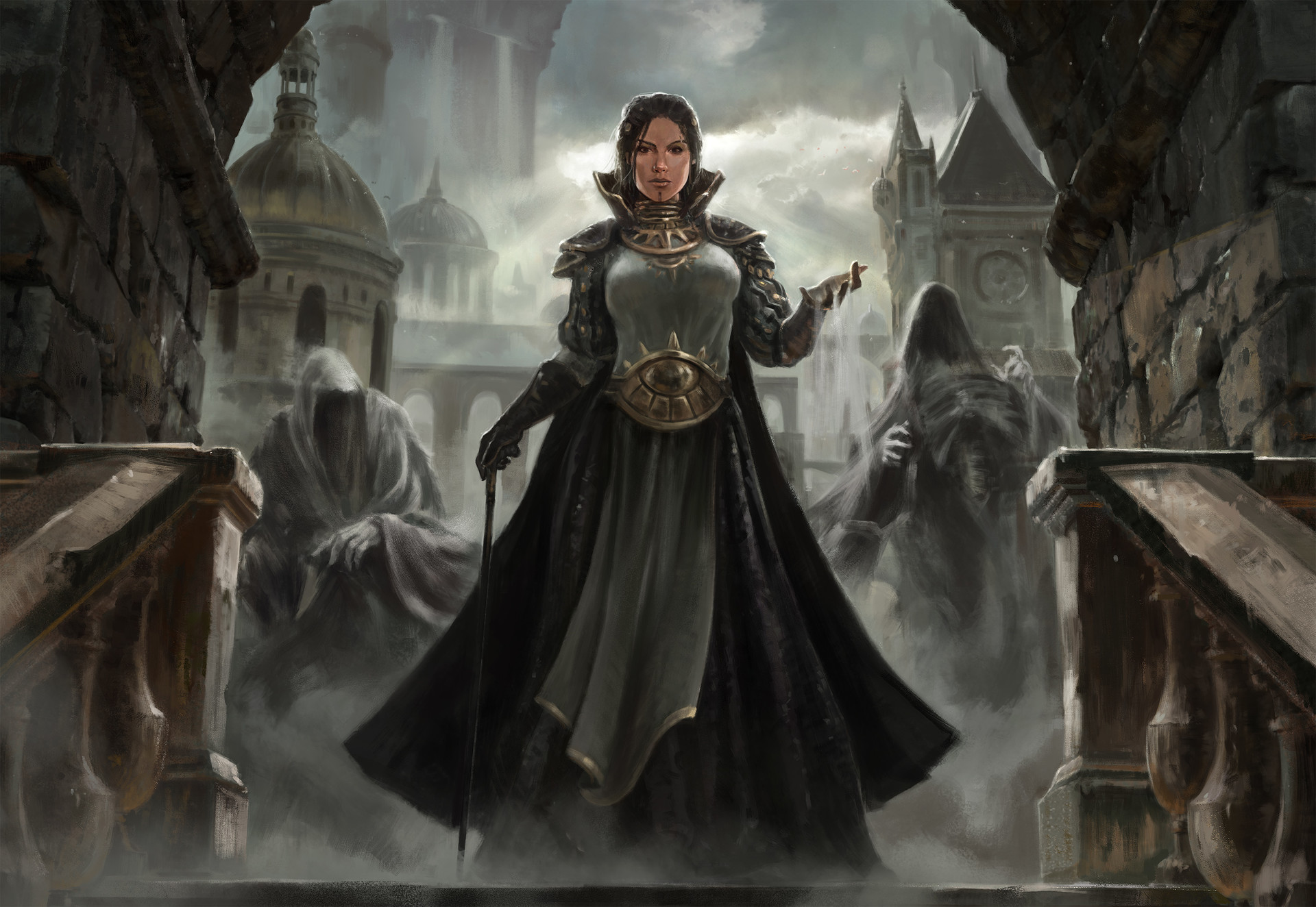



The School of Metallurgy
Originally developed by dwarves, the School of Metallurgy emphasizes order, organization, and community. Known as Metallurgists, wizards who belong to this Arcane Tradition use their magic to impose order on a disordered world.
Masters of powerful abjuration and transmutation magic, Metallurgists wield an arcane alloy known as Arcanometal to great effect. Mages of this School are almost always Lawful in their outlook. Some seek to do the most good for the most people, while others use force to impose order on the world.
School of Metallurgy Features
| Wizard Level | Feature |
|---|---|
| 2nd | Arcanometal Adept, Metallurgist |
| 6th | Arcanometal Shield |
| 10th | Master Metallurgist |
| 14th | Metallum Arcanus |
Arcanometal Adept
When you adopt this Arcane Tradition at 2nd level, you are taught the secret ritual that Metallurgists use to synthesize Arcanometal, the signature alloy of the School of Metallurgy.
You can synthesize gold into liquid Arcanometal that you use to copy spells into your spellbook. For each level of the spell, you must expend 70 gold to create liquid Arcanometal to copy it. Spells added to your spellbook in this way become Arcanometal Spells for you, and gain the following benefits:
- When you cast an Arcanometal spell that deals damage you can choose for the spell to deal force or magical bludgeoning damage in place of its normal damage.
- When you cast an Arcanometal spell that targets one
or more friendly creatures, one target of the spell gains temporary hit points equal to your wizard level.
Metallurgist
At 2nd level, you learn to create simple Arcanometal items. You conduct a 1-hour ritual that crafts a Small or Tiny item made only of metal. The creation is completed at the end of the ritual, and the item appears in an unoccupied space of your choice within 5 feet of you. Any Arcanometal object that you create with this feature is visibly magical in appearance.
The object you create must be worth less than 100 gold. As part of this ritual, you must lay out metal raw material, which can include coins, with a value equal to the object you wish to create. The metal irretrievably coalesces and transforms into the creation at the ritual’s end. In place of providing metal, you can instead expend a spell slot of 1st-level or higher.
Once you use this feature, you must finish a short or long rest before you can use it again.
Arcanometal Shield
Beginning at 6th level, when you cast an Arcanometal Spell, you can siphon some of its power to create a shimmering shield of Arcanometal around yourself, granting yourself temporary hit points equal to twice the level of the spell slot you expended to cast the spell. While you have temporary hit points from this feature, you are resistant to all non-magical bludgeoning, piercing, and slashing damage.
Master Metallurgist
You wield your Arcanometal as an extension of your very self. Starting at 10th level, you can use your Metallurgist feature to create metal objects with a value of up to 1000 gold.
In addition, when you use your Metallurgist feature you can create larger metal objects, by spending higher level spell slots depending on the size as indicated in the table below:
| Spell Slot | Object Size | Spell Slot | Object Size |
|---|---|---|---|
| 3rd-level | Medium | 7th-level | Huge |
| 5th-level | Large | 9th-level | Gargantuan |
Metallum Arcanus
Your Arcanometal is a conduit for your overwhelming arcane power. Beginning at 14th level, when you have temporary hit points from your Arcanometal Shield, you gain resistance to all bludgeoning, force, piercing, and slashing damage.
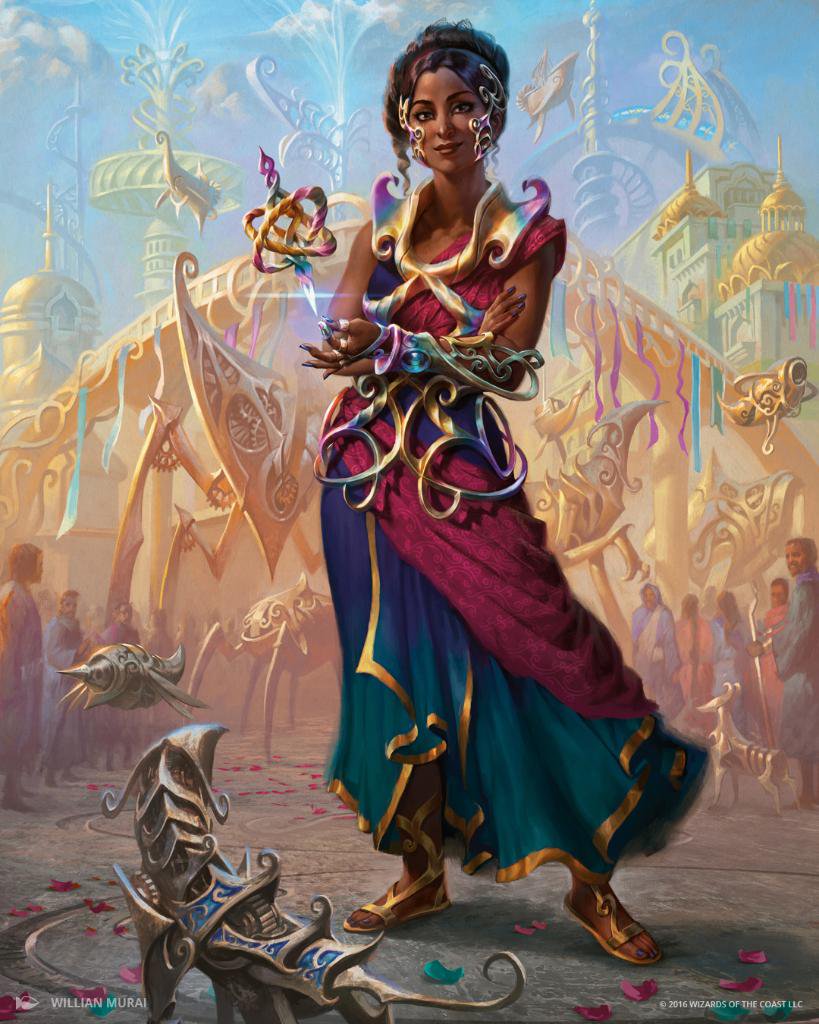



The School of Theurgy
Not all who serve deities of the upper planes do so as clerics, priests, and paladins. Some wizards focus their great intellect on studies of the divine, and in turn learn to produce divine magic. Wizards who join this school often reside in temples rather then towers, and tend to be more benevolent then their arcane counterparts. In their studies of the upper planes and their magic, these sages often find themselves sympathizing with the causes of the deities they spend their lives studying.
School of Theurgy Features
| Wizard Level | Feature |
|---|---|
| 2nd | Arcane Theologian, Channel Divinity |
| 6th | Channel Divinity: Harness Divine Power |
| 10th | Divine Protection |
| 14th | Blessed Intervention |
Arcane Theologian
When you adopt this Arcane Tradition at 2nd level, you gain access to divine magics unavailable to most wizards. You can copy any cleric spell that you find in other spellbooks or spell scrolls into your spellbook, so long as it does not restore hit points to its target. Any cleric spell you add to your spellbook through this feature counts as wizard spells for you.
Moreover, when you gain a wizard level, one of the spells you add to your spellbook can be from the cleric spell list, so long as the spell does not restore hit points to its target.
Channel Divinity
Also at 2nd level, you learn to channel divine energy directly from the upper planes, and use it to fuel magical effects. You start with one such Channel Divinity effect: Turn Undead.
Once you use your Channel Divinity to produce one of the divine effects you know, you must finish a short or long rest before you can use any of your Channel Divinities again.
If one of your Channel Divinity effects requires a creature to make a saving throw, it uses your wizard spell save DC.
Should you find a scroll, tome, or a willing teacher, you can copy additional Channel Divinities into your spellbook. To do so, you must spend 100 gold on blessed inks and parchment and spend 8 hours copying the prayers into your spellbook.
Channel Divinity: Turn Undead
As an action, you present a holy symbol and speak a prayer censuring undead creatures. Undead within 30 feet that can see or hear you must succeed on a Wisdom saving throw or be turned for 1 minute, or until they take any damage.
A turned creature must use its turn to move as far away from you as it can. It cannot willingly move to a space within 30 feet of you, or take reactions. For its action, it can use only the Dash action or try to escape from an effect that prevents it from moving. If it can't move, it can use the Dodge action.
Channel Divinity: Harness Divine Power
Upon reaching 6th level you gain the Channel Divinity option here. As a bonus action, you can grasp a holy symbol, utter a prayer, and regain one expended 1st-level spell slot.
At certain wizard levels, you can use this Channel Divinity to regain expended spell slots of higher levels: at 10th level (2nd-level spell slots) and 14th level (3rd-level spell slots).
Divine Protection
Your knowledge of the upper planes grants you a measure of protection against evil. Beginning at 10th level, When a fiend or undead attacks you, it must make a Wisdom saving throw. On a failed save, the creature must choose a different target, or the attack automatically misses. On a successful save, the creature is immune to this effect for 24 hours.
Any creature with an Intelligence of 4 or higher is aware of this effect before it makes its attack against you.
Blessed Intervention
Beginning at 14th level, you can use your knowledge of the divine to implore a being of the upper planes for direct aid.
As an action, you can grasp a holy symbol and beseech that deity for aid, naming a cleric or wizard spell of your choice, of a level for which you have a spell slots. Roll percentile dice. If the result is equal to, or higher, then the number on the table below for the level of spell you wish the deity to cast, you are successful. On a success, the spell is instantly cast as if you had cast it without expending a spell slot or components.
Once you use this feature to successfully cast a spell, you must complete 1d6 +1 long rests before you can use it again.
| Level | d100 |
|---|---|
| 1st | 10 + |
| 2nd | 20 + |
| 3rd | 30 + |
| Level | d100 |
|---|---|
| 4th | 40 + |
| 5th | 50 + |
| 6th | 60 + |
| Level | d100 |
|---|---|
| 7th | 70 + |
| 8th | 80 + |
| 9th | 90 + |






Arcane
Traditions
Master a multitude of new pathways to overwhelming arcane power with ten new
Arcane Traditions for the Wizard class in 5e.
Hedge Magic - Familiarist - Ritualist
&
The Formal Wizarding Schools of:
Alchemy - Biomancy - Chronomancy
Hemomancy - Hexcraft - Metallurgy - Theurgy
Version 2.0.1 - Created by /u/laserllama
Artist Credits:
Covers - Victor Adame - Teller of Tales
Page 1 - Manuel Castañón - Avid Arcanist
Page 3 - Hugh Pinder - MTG: Hard Cover
Page 4 - Lie Setiawan - Clone Crafter
Page 5 - David Rapoza - Forbidden Alchemy
Page 6 - Yongjae Choi - Teferi, Master of Time
Page 7 - Fesbra - Bloodvial Purveyor
Page 8 - Paul Canavin - Revival
Page 9 - Willian Murai - Saheeli Rai
Page 10 - D. Ljunggren - Book of Exalted Deeds
